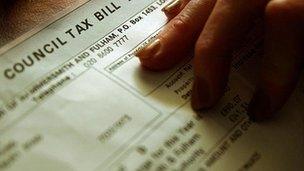Council tax: Referendum needed for bill rise above 3.5%
- Published

Most councils in England have frozen bills this year
Any local authority in England wanting to raise council tax by more than 3.5% next year must consult the public in a referendum, the government has said.
Under plans unveiled by Local Government Secretary Eric Pickles, councils losing a referendum would have to revert to a lower increase in bills.
Councils seeking to raise bills in tough economic times needed a "direct democratic mandate" to do so, he said.
But council groups said referendums should not be "decreed by Whitehall".
Ministers have offered English councils Ā£650m in cash to freeze bills next year. However, at least one council - Brighton and Hove Council - has said it intends to raise council tax saying government budget cuts have made this necessary.
Powers to hold local referendums over council tax were approved as part of the Localism Act, passed by Parliament recently.
Mr Pickles announced on Thursday that the trigger for a council tax vote would be any council proposing a hike in bills of more than 3.5%.
'Moral obligation'
This threshold, which must be approved by Parliament, would only apply during 2012-3. In future years, the level will be decided by ministers at the time.
Mr Pickles said the plan would stop "big" bill increases and was a "radical extension" of direct democracy.
"Councils have a moral obligation to help hard-working families and pensioners with the cost of living," he said. "If they want to hike taxes on their local residents above 3.5% they will now need to get a direct democratic mandate to do it."
The “óĻó“«Ć½'s local government correspondent Mike Sergeant said the referendum threshold had been set lower than expected - some way below the current rate of inflation which stands at 5.0%.
Most English councils have frozen council tax for the past two years, receiving subsidies from government if they choose to keep bills down.
But Brighton and Hove City Council, which is run by the Green Party, said earlier this month that it would have to increase council tax by 3.5% each year for the next two years in order to protect key services and the most vulnerable residents.
Under current proposals, the council would not be obliged to hold a referendum unless it proposed a 3.6% rise.
'Whitehall decree'
But the Local Government Association, which speaks on behalf of 400 councils in England and Wales, said it opposed the idea of staging referendums on the issue and that councillors were accountable for their decisions at elections.
"It should be for local people to determine whether they find a suggested council tax increase 'excessive', rather than Whitehall decreeing what constitutes 'excessive' from the centre," its chairman Sir Merrick Cockell said.
"If local referendums are to be truly localist, they should be triggered by local people."
Annual Whitehall funding for local government is due to fall by about 7% between 2011 and 2015 as part of the coalition's deficit reduction drive.
Labour have accused the government of front-loading cuts on town halls so they are forced to reduce services and staff.
But a recent report by the Local Government Association suggested the majority of councils were managing the budget squeeze and not facing immediate financial difficulties.
- Published1 December 2011
- Published17 November 2011